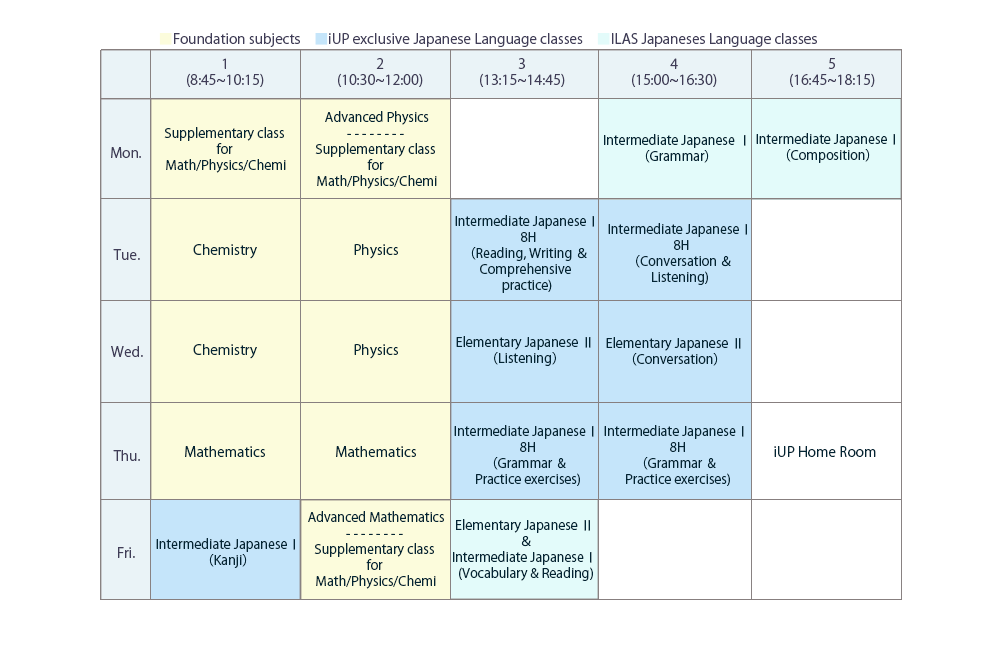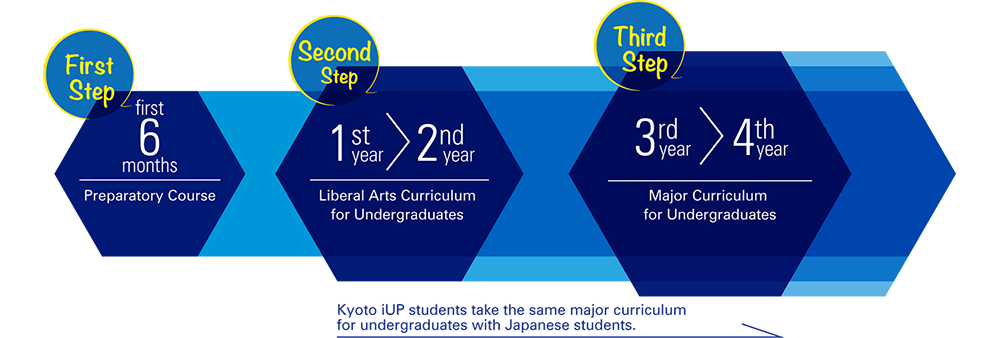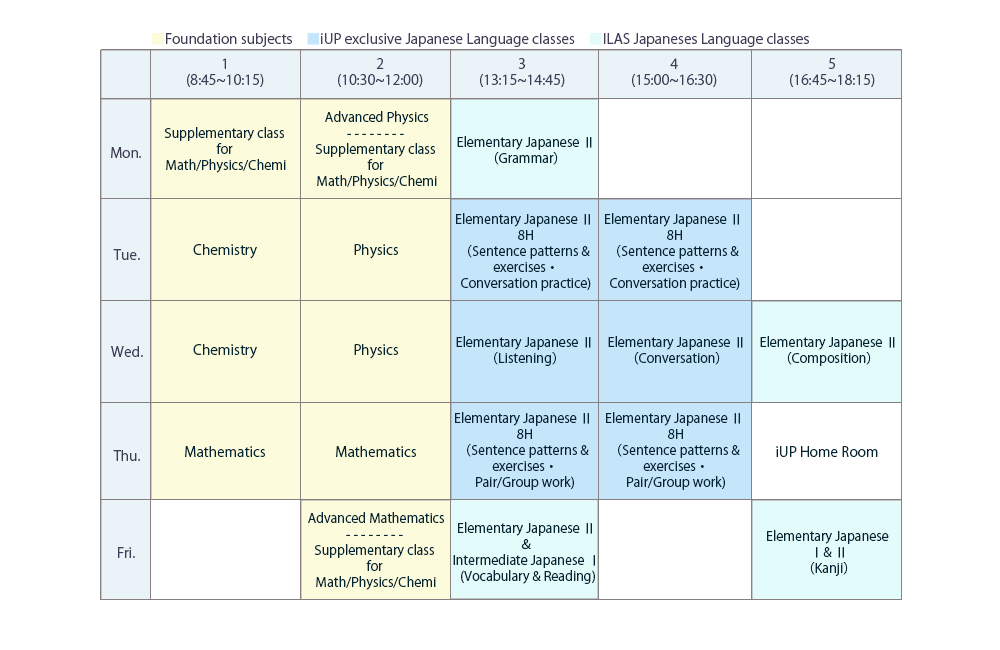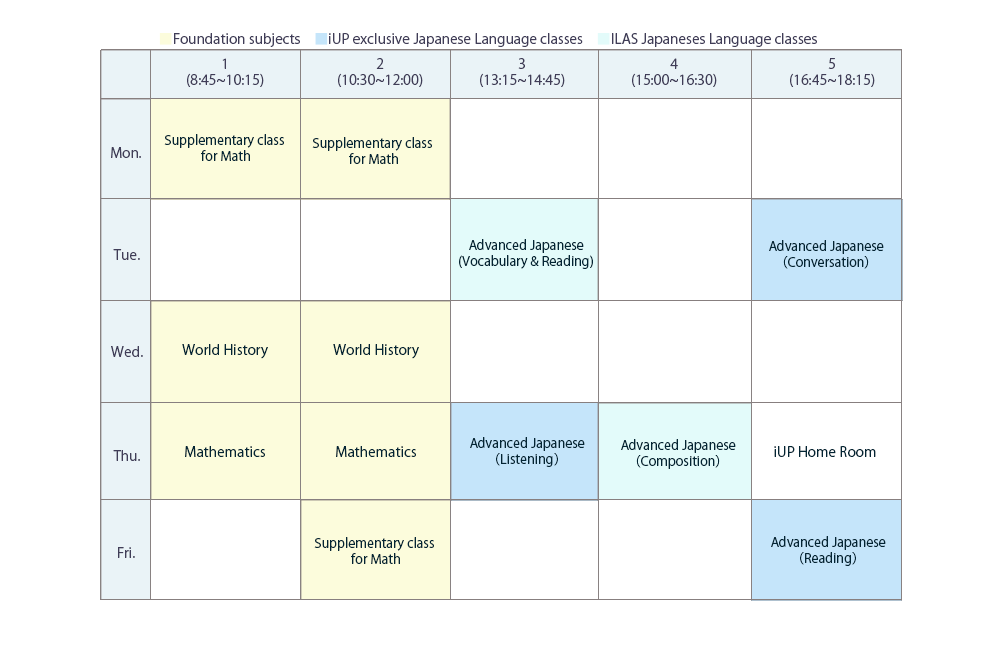Curriculum
Kyoto iUP comprises a six-month preparatory course followed by a four-year undergraduate program. In the first two-and-a-half years, students develop an essential understanding of core subjects in both English and Japanese, and acquire sufficient Japanese language proficiency to attend specialized lectures, then pursue advanced studies in Japanese in their final two years.
Japanese Language study
The Japanese language classes are divided into five levels*: Elementary I, Elementary II, Intermediate I, Intermediate II and Advanced levels.
The program provides intensive Japanese language classes in the first six months of the preparatory course, and further courses throughout the subsequent two years of the undergraduate program. The Japanese courses are designed to enable students to attain sufficient proficiency to attend regular undergraduate lectures and seminars conducted in Japanese from their third year. Kyoto iUP students intensively study Japanese language in the first two and half years according to the curriculum course tree** set for each level at the beginning of the preparatory course.
*Achievement goals to be attained upon completion of each level
**Japanese curriculum course tree for Kyoto iUP students
Preparatory Course
To get into undergraduate study program at Kyoto University, students should first complete the preparatory course.
The purpose of the preparatory course is to improve students' Japanese language skills, and to fill the gap between the contents of study in students' country and Japan as well as connecting smoothly with the undergraduate course.
Kyoto iUP Preparatory Course consists of:
-
- Japanese Language Classes
- Foundation Subjects
1. Japanese Language Classes
The Japanese language classes in the preparatory course aim Kyoto iUP students to acquire the study skills and the high level of proficiency in Japanese required for further undergraduate study.
Japanese language courses consist of two types of classes, (1)Japanese language courses exclusive to Kyoto iUP students of the preparatory course and (2)ILAS Japanese language courses*** .
Individual study plan will be arranged according to student's level of Japanese language proficiency. Each student's level of Japanese language proficiency will be determined based on not only individual learning history, but also the results of a placement test which will be conducted before their enrollment in the preparatory course. In addition, successful candidates will be provided with preliminary Japanese language lessons before the commencement of the preparatory course, if deemed necessary (based on students' Japanese language ability). Students are also able to study Japanese by themselves before coming to Japan through our e-learning system SAMIDORI.
*** Japanese language courses offered by ILAS (Institute for Liberal Arts and Sciences), which are designated for students to study together with other international students on campus.
Kyoto iUP Preparatory Japanese Language Courses
● Elementary II course
● Intermediate I course
● Intermediate II course
● Advanced course
2. Foundation Subjects
For a smooth transition into the undergraduate course, during the preparatory course, the gap between the contents of study such as Chemistry, Physics and Mathematics in students' country and Japan must be filled. The foundation subjects that students will take are designated by prospective faculties which they wish to enroll.
Foundation subjects will be conducted in English only. For students who wish to study natural sciences, subjects such as Mathematics, Physics, Chemistry etc. will be provided. For students who wish to study social sciences or humanities, subjects such as World History, etc. will be provided.
Required Foundation Subjects Designated by Each Faculty
for the Kyoto iUP preparatory course AY2022
Faculty of Integrated Human Studies
Faculty of Education
To be determined by student's level of Japanese language procifiency
Faculty of Law
To be determined by student's level of Japanese language procifiency
Faculty of Economics
Faculty of Science
● Mathematics ● Physics ● Chemistry
Faculty of Engineering
● Mathematics ● Physics ● Chemistry
Faculty of Agriculture (except for Department of Food and Environmental Economics)
● Mathematics ● Physics ● Chemistry
Faculty of Agriculture - Department of Food and Environmental Economics
Note: Additional classes maybe provided depending on each students' ability.
Timetable (example)
Below are typical timetables for the Kyoto iUP students in the preparatory course.
-
Timetable of the Kyoto iUP preparatory course student in the Elementary II level of Japanese language proficiency who is expected to enroll in the Faculty of Engineering
-
Timetable of the Kyoto iUP preparatory course student in the Intermediate I level of Japanese language proficiency who is expected to enroll in the Faculty of Engineering

-
Timetable of the Kyoto iUP preparatory course student in the Advanced level of Japanese language proficiency who is expected to enroll in the Faculty of Integrated Human Studies
Undergraduate Program
In principle, students in the Kyoto iUP undergraduate program register for courses according to the curriculum designated by each faculty to which they belong together with other Japanese and international students in the faculty. They are provided with
-
- Liberal Arts and Sciences Courses
- Specialized Courses offered by the Faculty
- Japanese Language Courses
1. Liberal Arts and Sciences Courses
In liberal arts and sciences programs, a wide variety of courses, from basic to advanced, are offered in English and Japanese for students in all major fields. Students are expected to learn autonomously, sequentially, and systematically about ways of developing ideas, knowledge and technique. They can choose courses from a variety of categories, including humanities and natural sciences, according to their interests regardless of their majors.
You can find the list of liberal arts and sciences courses conducted in English here.
2. Specialized Courses offered by the Faculty
Specialized courses in each student's chosen major field are provided by each faculty. The number of specialized courses will increase gradually as the year goes up. Specialized courses include not only lectures but also seminars, experiments and trainings in order to acquire specific skills related to their chosen major fields. Depending on the faculty, a few specialized courses will be offered in Japanese from the 1st year of the undergraduate program but supports will be provided to help students study in Japanese.
For details of each faculty's curriculum, please refer to "Majors and Areas of Study".
3. Japanese Language Courses
Japanese language classes are provided to further enhance students' Japanese proficiency until they complete the "Advanced" level of classes (It is supposed to be reached by the end of 2nd year.)
Timetables (example)
Below are typical timetables of the Kyoto iUP students in the Undergraduate Program.
-
Timetable of the Kyoto iUP student in the 1st year of the Faculty of Engineering
■Liberal Arts and Sciences courses ■Japanese Language courses ■Specialized courses
| 1 (8:45-10:15) |
2 (10:30-12:00) |
3 (13:15-14:45) |
4 (15:00-16:30) |
5 (16:45-18:15) |
|
| Mon. | Linear Algebra with Exercises A | Advanced Japanese (Conversation) | |||
| Tue. | Linear Algebra with Exercises A | Mathematical Description of Natural Phenomena | Practice of Basic Informatics | ILAS Seminar-E2 :Nanostructured Materials | |
| Wed. | Calculus with Exercises A | Fundamental Chemical Experiments-E2 | Fundamental Chemical Experiments-E2 | ||
| Thu. | Basic Physical Chemistry (quantum theory)-E2 | Basic Organic Chemistry I-E2 | Fundamental Physics A | Advanced Japanese (Academic Reading IIIA) | |
| Fri. | Advanced Japanese (Report Writing A) | Advanced Japanese (Academic Reading IA) |
-
Timetable of the Kyoto iUP student in the 1st year of the Faculty of Law
■Liberal Arts and Sciences courses ■Japanese Language courses ■Specialized courses
*1st year students have the option to take the specialized courses offered in Japanese language if they meet the Advanced level of the Japanese language proficiency.
-
Timetable of the Kyoto iUP student in the 2nd year of Chemical Science and Technology of Faculty of Engineering
■Liberal Arts and Sciences courses ■Japanese Language courses ■Specialized courses
| 1 (8:45-10:15) |
2 (10:30-12:00) |
3 (13:15-14:45) |
4 (15:00-16:30) |
5 (16:45-18:45) |
|
| Mon. | 有機化学基礎及び演習 | Cultural Anthropology I-E2 | Advanced Japanese (Conversation) |
||
| Tue. | 物理化学基礎及び演習 | Mathematical Description of Natural Phenomena |
Theories of Justice and Human Rights-E2 | ||
| Wed. | 理工化学概論 |
Intermediate Japanese II (Reading) | Japanese History I-E2 |
International History 1900 to the Present-E2 | |
| Thu. | 化学プロセス工学基礎 | Revisiting Basic Physical Chemistry (thermodynamics)-E2 | |||
| Fri. | 基礎無機化学 | Advanced Japanese (Report Writing A) |
-
Visit ILAS Website for detailed information on each "Liberal Arts and Sciences course". Input the name of each course in the "Course title" box to search the syllabus of courses.
- Kyoto University Open Course Ware(OCW), open publication of Kyoto University course materials, is available for detailed information on specialized courses offered by each faculty. Click on the "Syllabus" and browse courses or type the course title into the search text box to find the syllabus.
- For your reference, external link to its syllabus are added on the timetable of 2nd year student of Chemical Science and Technology of Faculty of Engineering.
- For more information about Kyoto iUP students' daily life and study, please visit the Blog.










